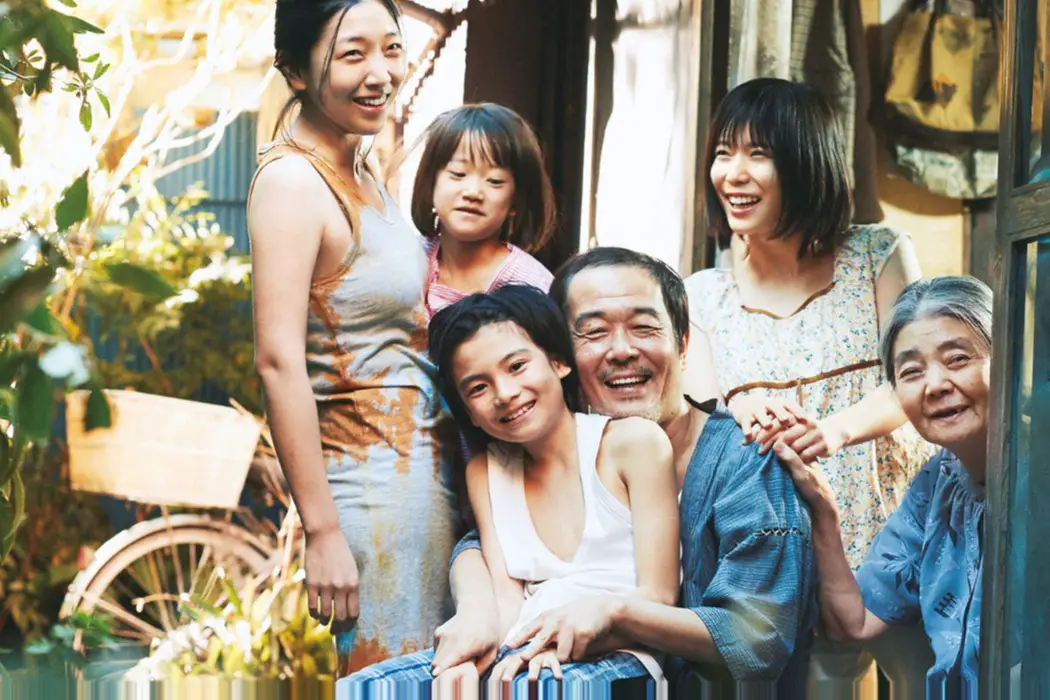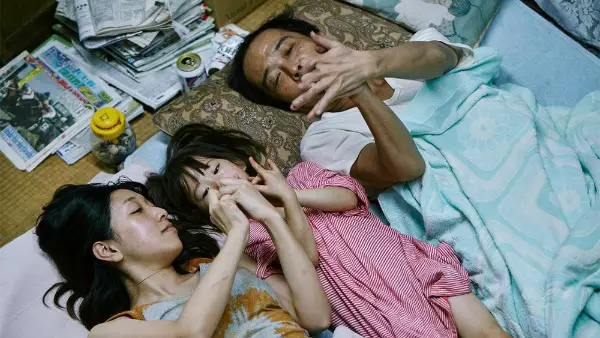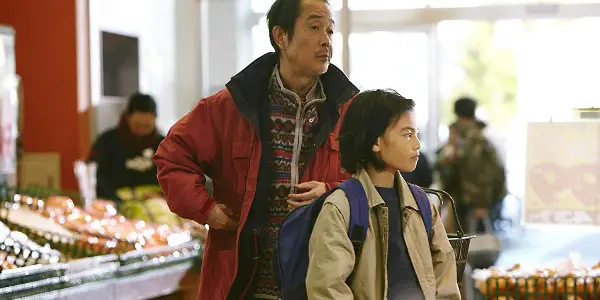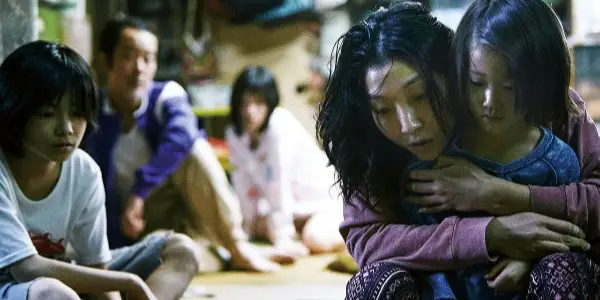SHOPLIFTERS: A Beautiful Portrait Of A Poverty Stricken Family

Alistair is a 25 year old writer based in Cambridge.…
Hirokazu Kore-eda‘s skill as a director is in finding moments of understated, purely human joy within the lives of his subjects. Although he has named Ken Loach a primary inspiration, his films refuse to depict the lives of those in the margins of society as being merely tragic with no added nuance, let alone get overtly political by examining how they found themselves in this position.
Shoplifters may feel like it could have been ripped from the headlines anytime in the past decade, due to how tangible it feels to a world where many poorer families are still recovering from a recession and the years of austerity that followed. Kore-eda just chooses to prioritise the heart over the shocking headline.
The Relatable Humanity behind a Political Tragedy
Kore-eda isn’t interested in making his characters simple conduits for a damning criticism of Japanese society. He’s more interested in the minutiae of their daily lives over their overbearing economic struggle, building several warm character studies each deserving of a film of their own. This isn’t a “feel good” movie by any means, but it’s one that understands that the small, joyous moments are far more important to anchor this story around, rather than the miserable living situation the nuclear family at the centre has found itself in. It’s hard to imagine many other social realist filmmakers being so adept at averting dramatic cliches and well trodden political commentary to depict a beautifully realised normality buried within such a tragic family life.
Osamu (Lily Franky) and his wife Nobuyo (Sakura Ando) live in a cramped house with a multitude of family members, making ends meet with occasional employment but mostly living off the state pension of elderly Hansue (Kirin Kiki, who passed away earlier this year). Osamu gets food for the whole family via an elaborate shoplifting technique he’s devised with his adopted son Shota (Kairi Jō), with the family all in good spirits despite living outside of the law, and with limited financial means due to a lack of long term job opportunities.

One day, when walking home from a supermarket shoplift, Osamu encounters a young girl, Yuri (Miyu Sasaki), who he keeps seeing being left alone in her house. Assuming she’s being neglected by her parents, he takes her back to the family home, where they decide to care for her full time. This means that, to the wider world, it appears that she has been kidnapped, something that they’re initially concerned with. As they discover the trauma of her home life, they realise that, as imperfect as their family home is, they can do a better job of taking care of her than her parents, even if it means making her go “off the grid” in the process.
The director’s previous film, The Third Murder, was something of a change of pace. Although he’s dabbled in genre experimentations before, the courtroom thriller saw Kore-eda detract from his own openly humanistic worldview to craft a more morally complex drama than we’d expect from him. The film proved to be somewhat divisive amongst critics, largely because the director’s skill at creating empathetic characters was ill-served by the material – to me, it felt like he was openly questioning his innate humanism by offering no easy answers to the criminal case at the centre. With Shoplifters, he’s proved this flirtation with a more pessimistic worldview was short-lived; the misery we find within this film is vastly overshadowed by a moving portrait of a nuclear family whose affection for each other helps them overcome the stress of living their lives hidden from society.
A Typically Kore-eda family drama
Shoplifters does bear some similarity to Kore-eda’s earlier films, but it feels more like an organic elaboration on previously examined themes, rather than a director retreating back to familiar subject matter after straying out of their comfort zone. His 2004 film Nobody Knows, about four young children living in an apartment all by themselves after their mother leaves unannounced, is the biggest comparison. The two children here have been “rescued” after being seen in moments of distress by their new parental figures; they’re provided with a more welcoming home life, yet now have to live away from society’s glare, to the extent that they have both been reported as getting kidnapped.

In both films, Kore-eda likes to spend time with the children away from the glares of the adults, here finding a sense of contentment that was previously absent from their home life – even if it was delivered to them by illegal means, that has robbed them of conventional childhood experiences. Here, they can’t even go to school, getting told that school is just a place for children who aren’t lucky enough to get taught at home.
The film also has echoes of Like Father, Like Son as it explores the morality of raising a family in this way. Whereas that film relied more on a conventional narrative mechanism, here the moral quandary is consistently hinted at throughout; these children are given love by their new family that was eluded to them in their home lives, but it’s come at the cost of living a comparatively prosperous childhood. They’ve been embraced with open arms, but have been inducted into a poverty stricken life in order to receive this.
Kore-eda‘s humanism means that he doesn’t judge the actions of the more senior characters, making sure to depict happy family moments (trips to the beach, expressions of love) in a manner that undercuts any simplistic impulse to criticise them for their actions – it’s an earnestly moving family drama, even with its moral complexities hidden in plain view throughout.

When the film moves in a more conventional storytelling direction in the third act, it’s to Kore-eda‘s credit that it doesn’t undermine everything we’ve seen before. As with many of his films, he’s unburdened by plot, finding the most compelling drama within the small moments of his subjects’ lives. He never dwells on the fact that three generations have resorted to sleeping in one cramped room, a detail other filmmakers would fixate on, instead richly detailing their daily routines without making their impoverishment get close to becoming the chief focus.
Instead, he shows us everything from the grandma spending her days at a pachinko parlour to one of the older “daughters” earning money as a cam girl, with hidden emotional depths to each of their most mundane encounters. These characters feel lived in, written in a manner that makes you believe that they exist outside of the confines of this film. We only see snapshots of their lives, yet they are so richly detailed, you can easily imagine what their lives would entail outside of this story.
Shoplifters: Conclusion
After spending his entire career finding the profundity in the mundane, Kore-eda has produced his finest example of this yet; boldly refusing to ever become reductive “poverty porn” in order to become one of the most sublimely realised character studies he’s ever produced.
Shoplifters is released in the UK and US on November 23. All international release dates are here.
https://www.youtube.com/watch?v=iwC2A-JiLbc
Does content like this matter to you?
Become a Member and support film journalism. Unlock access to all of Film Inquiry`s great articles. Join a community of like-minded readers who are passionate about cinema - get access to our private members Network, give back to independent filmmakers, and more.
Alistair is a 25 year old writer based in Cambridge. He has been writing about film since the start of 2014, and in addition to Film Inquiry, regularly contributes to Gay Essential and The Digital Fix, with additional bylines in Film Stories, the BFI and Vague Visages. Because of his work for Film Inquiry, he is a recognised member of GALECA, the Gay & Lesbian Entertainment Critics' Association.













